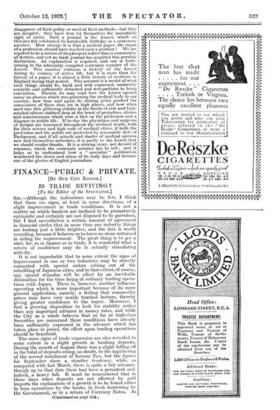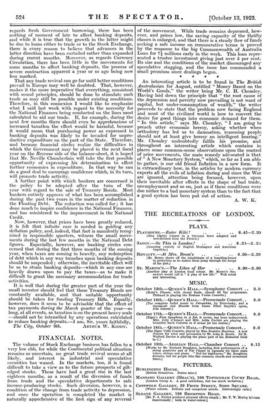FINANCE—PUBLIC & PRIVATE.
[By OUR CITY EDITOR.] IS TRADE REVIVING? [To the Editor of the SPECTATOR.] SIR,—Although the indications may be few, I think that there are signs, at least in some directions, of a slight improvement in trade conditions. It is not a matter on which bankers are inclined to be prematurely optimistic and certainly are not disposed to be garrulous, but I find nevertheless a certain amount of agreement in financial circles that in more than one industry things are looking just a little brighter, and the fact is worth recording, because it behoves us to leave no stone unturned in aiding the improvement. The great thing is to get a start, for, as in finance so in trade, it is wonderful what a return of confidence may do in actually stimulating activity. It is not improbable that to some extent the signs of Improvement in one or two industries may be directly connected with special orders arising out of the rebuilding of Japanese cities, and to that extent, of course, any special stimulus will be offset by an inevitable diminution for the time being of ordinary trading opera- tions with Japan. There is, however, another influence operating which is more important because of its more general application, namely, a feeling that commodity prices may have very nearly touched bottom, thereby giving greater confidence to the buyer. Moreover, I find a growing disposition to look for stability rather than any important advance in money rates, and while the City as a whole believes that so far as high-class Securities are concerned these conditions have already been sufficiently expressed in the advance which has taken place in prices, the effect upon trading operations should be beneficial.
The same signs of trade expansion are also revealed to some .extent in a slight growth in banking deposits. During the month of August there was a slight falling off in the total of deposits owing, no doubt, to the ingathering of the second instalmentof Income Tax, but the figures for September show a steadier tendency, while, as compared with last March, there is quite a fair advance, though up to that date there had been a persistent and, indeed, a heavy fall. It must be remembered that in these days when deposits are not affected by gold imports the explanation of a growth is to be found either in loan operations by the banks, in fresh borrowing by the Government, or in a return of Currency Notes. AS (Continued on pare 524.) regards fresh Government borrowing, there has been nothing of moment of late to affect banking deposits, and while it is true that the growth in the latter might be due to loans either to trade or to the Stock Exchange, there is every reason to believe that advances in the latter direction have been curtailed rather than expanded during recent months. Moreover, as regards Currency Circulation, there has been little in the movements for some months to affect banking deposits, the -process of severe contraction apparent a year or so ago being now less marked.
That any trade revival can go far until better conditions prevail in Europe may well be doubted. That, however, makes it the more imperative' that everything, consistent with sound principles, should be done to stimulate such trade as may still be possible under existing conditions. Therefore, in this connexion I would like to emphasize what I said last week with regard to the necessity for the National Finances being conducted on the lines most calculated to aid our trade. If, for example, during the next few months there should even be apprehensions of increased taxation the effect would be harmful, because it would mean that purchasing power as expressed in banking deposits was likely to be invaded for unpro- ductive expenditure on the part of the State. Therefore, and because financial circles realize the difficulties in which the Government may be placed in the next fiscal year on the Revenue side of the balance-sheet, it is hoped that Mr. Neville Chamberlain will take the first possible opportunity of expressing his determination to effect further economies in expenditure. In that way he can do a good deal to encourage confidence which, in its turn, will promote trade activity. A further point with which bankers are concerned is the policy to be adopted after the turn of the year with regard to the sale of Treasury Bonds. Most bankers entirely approve of what has been accomplished during the past two years in the matter of reduction in the Floating Debt. The reduction was called for ; it has done much to inspire confidence in the National Finances, and has ministered to the improvement in the National Credit.
Now, however, that prices have been greatly reduced, it is felt that infinite care is needed in guiding any deflation policy, and, indeed, that fact is manifestly recog- nized in responsible quarters, witness the small move- ments during the last few months in the National Debt figures. Especially, however, are banking circles con- cerned that during the first three months of the coining year, when taxes are coming in heavily, any redemption of debt which in any way trenches upon banking deposits should be suspended ; otherwise, the inevitable effect will be so to strain banking deposits—which in any case are heavily drawn upon to pay the taxes—as to make it difficult to grant the necessary accommodation for trade activities.
It is well that during the greater part of the year the small investor should feel that these Treasury Bonds are constantly available, and that suitable opportunity should be taken for funding Treasury Bills. Equally, however, does it seem to be advisable that the effect of tax payments during the March quarter of the year—so long, at all events, as taxation is on the present heavy scale —should not be intensified by any operations calculated to reduce banking deposits.—I am, Sir, yours faithfully,



























































 Previous page
Previous page